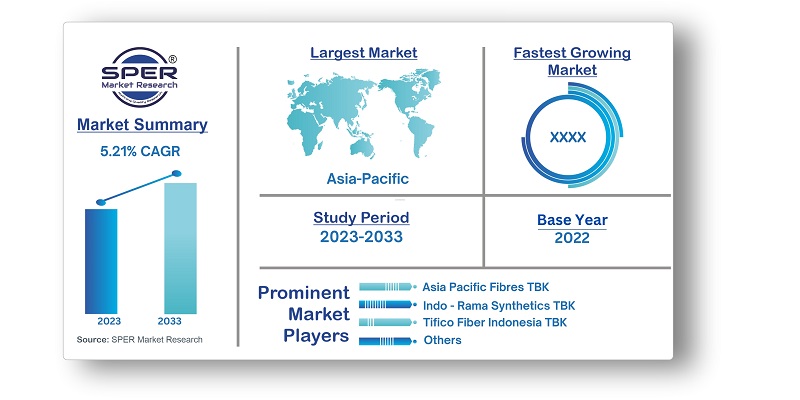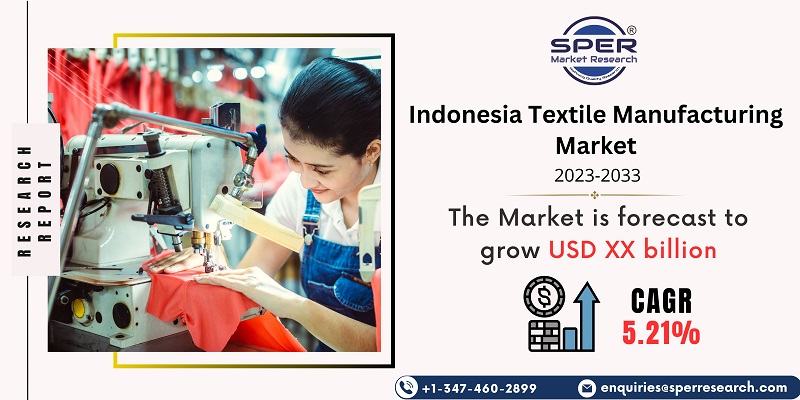
Indonesia Textile Manufacturing Market Growth, Trends, Size, Revenue, Share and Future Outlook
Indonesia Textile Manufacturing Market Size- By Textile Type, By Process Type, By Machinery Type- Regional Outlook, Competitive Strategies and Segment Forecast to 2033
| Published: Oct-2023 | Report ID: COAM2333 | Pages: 1 - 104 | Formats*: |
| Category : Construction & Manufacturing | |||
- In January 2022, the blockchain-based Toray Industries of Indonesia announced a partnership with Soramitsu Company of Japan. This collaboration's primary goal is for Toray Industries to integrate patented fabric recycling, biomass, and other sustainable technologies that can support a closed-loop economy by reusing fabrics. In order to improve traceability during product collection, reuse, and other activities, it also plans to integrate Soramitsu's blockchain technologies into its product supply chain.
- The US Trust Cotton protocol and PT Pan Brothers PTK announced their partnership in March 2021. The major goal of this partnership is for PT.Pan Brothers PTK to reassure their customers that they have approved supply chain partners for brands and retailers that are purchasing cotton that has been cultivated more sustainably.


| Report Metric | Details |
| Market size available for years | 2019-2033 |
| Base year considered | 2022 |
| Forecast period | 2023-2033 |
| Segments covered | By Textile Type, By Process Type, By Machinery Type |
| Regions covered | Eastern Region, Southern Region, Western Region, Northern Region |
| Companies Covered | Asia Pacific Fibres TBK, Indo - Rama Synthetics TBK, Sri Rejeki Isman TBK, Tifico Fiber Indonesia TBK, PT Pan Brothers TBK, PT Ever Shine Tex TBK, PT Trisula Textile Industries TBK, PT Century Textile Industry TBK (Toray Industries), PT Polychem Indonesia TBK, and PT Argo Pantes TBK. |
- Fashion Brands and Retailers
- Apparel Manufacturers
- Home Textile Companies
- Automotive Industry
- Industrial and Technical Textiles
- Designers and Fashion Entrepreneurs
- Textile Machinery and Equipment Manufacturers
| By Textile Type: |
|
| By Process Type: |
|
| By Machinery Type: |
|
- Indonesia Textile Manufacturing Market Size (FY’2023-FY’2033)
- Overview of Indonesia Textile Manufacturing Market
- Segmentation of Indonesia Textile Manufacturing Market By Textile Type (Fabric, Fiber, Garment, Yarn, Others)
- Segmentation of Indonesia Textile Manufacturing Market By Process Type (Finishing, Knitting, Spinning, Weaving, Others)
- Segmentation of Indonesia Textile Manufacturing Market By Machinery Type (Automated Machines, CONSOLE/Assembly Line Installations, Simple Machines)
- Statistical Snap of Indonesia Textile Manufacturing Market
- Expansion Analysis of Indonesia Textile Manufacturing Market
- Problems and Obstacles in Indonesia Textile Manufacturing Market
- Competitive Landscape in the Indonesia Textile Manufacturing Market
- Impact of COVID-19 and Demonetization on Indonesia Textile Manufacturing Market
- Details on Current Investment in Indonesia Textile Manufacturing Market
- Competitive Analysis of Indonesia Textile Manufacturing Market
- Prominent Players in the Indonesia Textile Manufacturing Market
- SWOT Analysis of Indonesia Textile Manufacturing Market
- Indonesia Textile Manufacturing Market Future Outlook and Projections (FY’2023-FY’2033)
- Recommendations from Analyst
1.1. Scope of the report1.2. Market segment analysis
2.1. Research data source2.1.1. Secondary Data2.1.2. Primary Data2.1.3. SPER’s internal database2.1.4. Premium insight from KOL’s2.2. Market size estimation2.2.1. Top-down and Bottom-up approach2.3. Data triangulation
4.1. Driver, Restraint, Opportunity and Challenges analysis4.1.1. Drivers4.1.2. Restraints4.1.3. Opportunities4.1.4. Challenges4.2. COVID-19 Impacts of the Indonesia Textile Manufacturing Market
5.1. SWOT Analysis5.1.1. Strengths5.1.2. Weaknesses5.1.3. Opportunities5.1.4. Threats5.2. PESTEL Analysis5.2.1. Political Landscape5.2.2. Economic Landscape5.2.3. Social Landscape5.2.4. Technological Landscape5.2.5. Environmental Landscape5.2.6. Legal Landscape5.3. PORTER’s Five Forces5.3.1. Bargaining power of suppliers5.3.2. Bargaining power of buyers5.3.3. Threat of Substitute5.3.4. Threat of new entrant5.3.5. Competitive rivalry5.4. Heat Map Analysis
6.1. Indonesia Textile Manufacturing Market Manufacturing Base Distribution, Sales Area, Product Type6.2. Mergers & Acquisitions, Partnerships, Product Launch, and Collaboration in Indonesia Textile Manufacturing Market
7.1. Indonesia Textile Manufacturing Market Value Share and Forecast, By Textile Type, 2023-20337.2. Fabric7.3. Fiber7.4. Garment7.5. Yarn7.6. Others
8.1. Indonesia Textile Manufacturing Market Value Share and Forecast, By Process Type, 2023-20338.2. Finishing8.3. Knitting8.4. Spinning8.5. Weaving8.6. Others
9.1. Indonesia Textile Manufacturing Market Value Share and Forecast, By Machinery Type, 2023-20339.2. Automated Machines9.3. CONSOLE/Assembly Line Installations9.4. Simple Machines
10.1. Indonesia Textile Manufacturing Market Size and Market Share
11.1. Indonesia Textile Manufacturing Market Size and Market Share By Textile Type (2019-2026)11.2. Indonesia Textile Manufacturing Market Size and Market Share By Textile Type (2027-2033)
12.1. Indonesia Textile Manufacturing Market Size and Market Share By Process Type (2019-2026)12.2. Indonesia Textile Manufacturing Market Size and Market Share By Process Type (2027-2033)
13.1. Indonesia Textile Manufacturing Market Size and Market Share By Machinery Type (2019-2026)13.2. Indonesia Textile Manufacturing Market Size and Market Share By Machinery Type (2027-2033)
14.1. Indonesia Textile Manufacturing Market Size and Market Share By Region (2019-2026)14.2. Indonesia Textile Manufacturing Market Size and Market Share By Region (2027-2033)14.3. Eastern Region14.4. Southern Region14.5. Western Region14.6. Norther Region
15.1. Asia Pacific Fibres TBK15.1.1. Company details15.1.2. Financial outlook15.1.3. Product summary15.1.4. Recent developments15.2. Indo - Rama Synthetics TBK15.2.1. Company details15.2.2. Financial outlook15.2.3. Product summary15.2.4. Recent developments15.3. Sri Rejeki Isman TBK15.3.1. Company details15.3.2. Financial outlook15.3.3. Product summary15.3.4. Recent developments15.4. Tifico Fiber Indonesia TBK15.4.1. Company details15.4.2. Financial outlook15.4.3. Product summary15.4.4. Recent developments15.5. PT Pan Brothers TBK15.5.1. Company details15.5.2. Financial outlook15.5.3. Product summary15.5.4. Recent developments15.6. PT Ever Shine Tex TBK15.6.1. Company details15.6.2. Financial outlook15.6.3. Product summary15.6.4. Recent developments15.7. PT Trisula Textile Industries TBK15.7.1. Company details15.7.2. Financial outlook15.7.3. Product summary15.7.4. Recent developments15.8. PT Century Textile Industry TBK (Toray Industries)15.8.1. Company details15.8.2. Financial outlook15.8.3. Product summary15.8.4. Recent developments15.9. PT Polychem Indonesia TBK15.9.1. Company details15.9.2. Financial outlook15.9.3. Product summary15.9.4. Recent developments15.10. PT Argo Pantes TBK15.10.1. Company details15.10.2. Financial outlook15.10.3. Product summary15.10.4. Recent developments15.11. Others
SPER Market Research’s methodology uses great emphasis on primary research to ensure that the market intelligence insights are up to date, reliable and accurate. Primary interviews are done with players involved in each phase of a supply chain to analyze the market forecasting. The secondary research method is used to help you fully understand how the future markets and the spending patterns look likes.
The report is based on in-depth qualitative and quantitative analysis of the Product Market. The quantitative analysis involves the application of various projection and sampling techniques. The qualitative analysis involves primary interviews, surveys, and vendor briefings. The data gathered as a result of these processes are validated through experts opinion. Our research methodology entails an ideal mixture of primary and secondary initiatives.



Frequently Asked Questions About This Report
PLACE AN ORDER
Year End Discount
Sample Report
Pre-Purchase Inquiry
NEED CUSTOMIZATION?
Request CustomizationCALL OR EMAIL US
100% Secure Payment






Related Reports
Our Global Clients
Our data-driven insights have influenced the strategy of 200+ reputed companies across the globe.




















